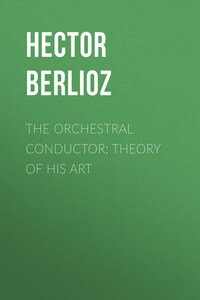THE ORCHESTRAL CONDUCTOR.
THEORY OF HIS ART
Music appears to be the most exacting of all the Arts, the cultivation of which presents the greatest difficulties, for a consummate interpretation of a musical work so as to permit an appreciation of its real value, a clear view of its physiognomy, or discernment of its real meaning and true character, is only achieved in relatively few cases. Of creative artists, the composer is almost the only one who is dependent upon a multitude of intermediate agents between the public and himself; intermediate agents, either intelligent or stupid, devoted or hostile, active or inert, capable – from first to last – of contributing to the brilliancy of his work, or of disfiguring it, misrepresenting it, and even destroying it completely.
Singers have often been accused of forming the most dangerous of these intermediate agents; but in my opinion, without justice. The most formidable, to my thinking, is the conductor of the orchestra. A bad singer can spoil only his own part; while an incapable or malevolent conductor ruins all. Happy indeed may the composer esteem himself when the conductor into whose hands he has fallen is not at once incapable and inimical; for nothing can resist the pernicious influence of this person. The most admirable orchestra is then paralyzed, the most excellent singers are perplexed and rendered dull; there is no longer any vigor or unity; under such direction the noblest daring of the author appears extravagant, enthusiasm beholds its soaring flight checked, inspiration is violently brought down to earth, the angel's wings are broken, the man of genius passes for a madman or an idiot, the divine statue is precipitated from its pedestal, and dragged in the mud. And what is worse, the public, and even auditors endowed with the highest musical intelligence, are reduced to the impossibility (if a new work is rendered, and they are hearing it for the first time) of recognizing the ravages perpetrated by the orchestral conductor – of discovering the follies, faults, and crimes he commits. If they clearly perceive certain defects of execution, not he, but his victims, are in such cases made responsible. If he has caused the chorus-singers to fail in taking up a point in a finale, if he has allowed a discordant wavering to take place between the choir and the orchestra, or between the extreme sides of the instrumental body, if he has absurdly hurried a movement, or allowed it to linger unduly, if he has interrupted a singer before the end of a phrase, they exclaim: “The singers are detestable! The orchestra has no firmness; the violins have disfigured the principal design; everybody has been wanting in vigor and animation; the tenor was quite out, he did not know his part; the harmony is confused; the author is no accompanist; the voices are – ” etc.
Except in listening to great works already known and esteemed, intelligent hearers can hardly distinguish the true culprit, and allot to him his due share of blame; but the number of these is still so limited that their judgment has little weight; and the hostile conductor – in presence of the public who would pitilessly hiss a vocal accident of a good singer – reigns, with all the calm of a bad conscience, in his baseness and inefficiency. Fortunately, I here attack an exception; for the malevolent orchestral conductor – whether capable or not – is very rare.
The orchestral conductor full of goodwill, but incapable, is on the contrary very common. Without speaking of innumerable mediocrities, directing artists who frequently are much their superiors, an author for example, can scarcely be accused of conspiring against his own works. Yet how many are there who, fancying they are able to conduct, innocently injure their best scores!
Beethoven, it is said, more than once ruined the performance of his symphonies; which he would conduct, even at the time when his deafness had become almost complete. The musicians, in order to keep together, agreed at length to follow the slight indications of time which the concertmeister (first violin-player) gave them; and not to attend to Beethoven's conducting-stick. Moreover, it should be observed, that conducting a symphony, an overture, or any other composition whose movements remain continual, vary little, and contain few nice gradations, is child's play in comparison with conducting an opera, or like work, where there are recitatives, airs, and numerous orchestral designs preceded by pauses of irregular length.
The example of Beethoven, which I have just cited, leads me at once to say that if the direction of an orchestra appears to be very difficult for a blind man, it is indisputably impossible for a deaf one, whatever may have been his technical talent before losing his sense of hearing.
The orchestral conductor should see and hear; he should be active and vigorous, should know the composition and the nature and compass of the instruments, should be able to read the score, and possess – besides the especial talent of which we shall presently endeavor to explain the constituent qualities – other indefinable gifts, without which an invisible link cannot establish itself between him and those he directs; otherwise the faculty of transmitting to them his feeling is denied him, and power, empire, and guiding influence completely fail him. He is then no longer a conductor, a director, but a simple beater of the time, – supposing he knows how to beat it, and divide it, regularly.








